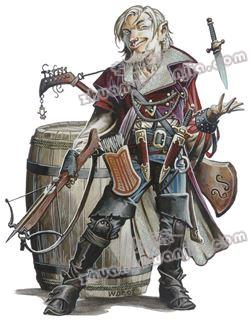美服《龙与地下城》吟游诗人大起底 全新职业定位抢先看
在过去几周,我们关注了邪术师和法师。今天,我们再来看看吟游诗人。
吟游诗人是个万能职业。在《专家级龙与地下城》中,该职业融合了战士、盗贼和德鲁伊,
直到第二版将这些概念大略的花划分为施法能力、盗贼能力和战斗能力。不幸的是,吟游诗人作为万事通却无一精专。在只有一个角色的情况下,吟游诗人可以轻易地展示出他的足智多谋聪明才智;但在多角色的团队合作中,吟游诗人往往就成了万年老二。
尽管如此,大家还是很想要跟这样一个反映机敏、足智多谋的英雄在一起的。尽管脑力方面的才能应以盗贼为主,但吟游诗人还是有些独特的魅力,让他大受欢迎。
在D&D Next的设计工作中,我们对吟游诗人的某些传统概念进行了大刀阔斧的改造,以期他在游戏中可以有更清晰的定位。

完整法术
吟游诗人每天的施法量巫师和牧师一样,要不是受到法术属性降低的限制,吟游诗人可以匹敌任何其他施法者。吟游诗人的魔法专注于欺骗,言语的力量以及影响情绪的能力。诗人横跨牧师和法师,但因治疗魔法的缘故,更靠近牧师一些。
这是个很简单的改变,但在对吟游诗人和其他职业进行比较的时候却花了大量的时间。我们不是简单的将其限定在施法者或非施法者中,而是硬性让其完全接受魔法。
吟游诗人鼓舞之力
游吟诗人的音乐被吟游诗人鼓舞之力取代。吟游诗人每天可以多次使用此能力。
吟游诗人可以用行动或演讲激励某一生物,利用天生的或后天训练得来的领导能力帮助他人实现自身价值。受影响的生物可获得d6,它可以添加到任何攻击或豁免。这种机械的好处在于它的灵活性。吟游诗人鼓舞之力可以团队面临的任何情,并允许接收者角色来确定如何使用它来构建一个游戏的叙事成分。
技能
在多个版本中,为反映吟游诗人作为足智多谋的英雄,我们添加了两个新功能。从2级开始,没有启用熟练奖励的吟游诗人会得到其价值的一半。因此,吟游诗人总是介于熟练和不熟练之间。
此外,像盗贼一样,吟游诗人掌握一定的技能。在不同的点,吟游诗人可以使用两个技能熟练,双倍提升角色的能力。
有以上这些职业特性创造出的吟游诗人是个天生的领导者,将施法与天赋技结合使用。吟游诗人可以很容易地承担起牧师在团队中的责任,有时甚至是法师。尽管吟游诗人少了法师的某些招牌技能,但其扩展队伍中其他角色有效性的能力可以很容易地弥补这个差距。职业玩家游戏工作室论坛,为您提供游戏项目,游戏辅助,VPN,国外游戏资讯等最新信息。
原文
The Bard’s Tale
Over the past couple of weeks, I've touched on the design process behind the sorcerer and warlock classes. This week, we turn our attention to the bard.
The bard has always been cast as a jack-of-all-trades. In AD&D, the class started as a peculiar mix of fighter, thief, and druid, before 2nd Edition merged those concepts into a mash-up of spellcasting, thief skills, and fighting ability. Unfortunately, being a jack-of-all-trades has often left the bard a master of none. In a story with a single character, the bard can easily shine as a resourceful, clever hero. In a game with a team of characters working together, the bard too often comes off as second best at everything.
Despite this, the idea of a clever, resourceful hero with quick wit and quicker reflexes is hard to step away from. Though the rogue captures many of the archetypes that those traits bring to mind, there's something about the panache and charisma that a bard can bring into play that makes the class so appealing.
In our design work on D&D Next, we took a sledgehammer to a few of the bard's traditional concepts in order to give the class a clear, unique place in the game.
Full Spells
A bard casts as many spells per day as a wizard or cleric. Rather than being limited by a reduced casting slate, the bard can match any of the other caster classes in bringing magic to the table. A bard's magic focuses on trickery, words of power, and the ability to sway emotions. The class straddles the line between clerics and wizards, though it leans a bit closer to cleric with its access to healing magic.
This is a simple change, but it goes a long way toward leveling the field when comparing the bard to other classes. Rather than forcing the bard to rest somewhere between a caster and a noncaster, we've pushed the class hard toward fully embracing magic.
Bardic Inspiration
Bardic music has been replaced with a mechanic called Bardic Inspiration. A bard has a number of uses of this ability each day.
A bard can inspire a creature with a performance or speech, using natural and trained leadership abilities to help others achieve greatness. The affected creature gains a d6 that it can add to any check, attack, or saving throw. The nice thing about this mechanic is its flexibility. Bardic Inspiration can be applied to any situation a party faces, and allowing the recipient character to determine how it is used helps to build the narrative component of a game.
Skills
Reflecting the feel of the bard as a resourceful hero across multiple editions, we've added two new features to the class. From 2nd level, a bard who doesn't apply a proficiency bonus to a check instead adds half the value of that proficiency bonus. A bard is thus always halfway between skilled and unskilled on any check.
In addition, like the rogue, the bard is a master of certain skills. At different points, a bard picks two skill proficiencies and adds double the character's proficiency bonus to checks involving those skills.
The bard created by this array of class features is a talented leader who combines spellcasting with a flair for skill use. A bard can easily take on the role that a cleric fulfills in a party, or can even stand in for a wizard. Though the class misses out on some of the wizard's signature combat spells, a bard's ability to extend the effectiveness of other characters in combat can easily make up the difference.